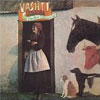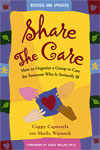 Oh my, if you don’t own British folk singer Vashti Bunyan’s reissued 1970 album “Just Another Diamond Day,” get ready to be playing it all day every day for several weeks. Bunyan was a beautiful, waif-like hippie who was thought to be the “female Bob Dylan,” or the next Marianne Faithful, by British record producers. But then “Diamond Day” didn’t sell, and Bunyan left the folk scene to raise her children on a farm. Until her album’s reissue, the kids didn’t even know she ever sang professionally.
Oh my, if you don’t own British folk singer Vashti Bunyan’s reissued 1970 album “Just Another Diamond Day,” get ready to be playing it all day every day for several weeks. Bunyan was a beautiful, waif-like hippie who was thought to be the “female Bob Dylan,” or the next Marianne Faithful, by British record producers. But then “Diamond Day” didn’t sell, and Bunyan left the folk scene to raise her children on a farm. Until her album’s reissue, the kids didn’t even know she ever sang professionally.
Now, “Diamond Day” is listed among Britain’s 100 best albums of all time. I just learned of it though a piece on folk music on NPR. If you like Celtic fiddle, Nick Drake, Enya, or penny whistles, you’ll flip over this. Warning: the ethereal, innocent beauty of her voice is something some men won’t gravitate toward. Listen to it before buying and you’ll hear her tributes to farm sunsets, horses, children, and the fire’s glow, all of which build to pay cumulative homage to the exquisite energy of ordinary life. My youngest Chattering just gets up and dances every time I put this CD on.
I love the idea that you never know what you may already have, that a woman could live in obscurity for years and then see that her message was heard, even cherished in the public eye. Here’s a snippet of an interview Bunyan gave to Pitchfork Media, where she expounds on this idea.
Pitchfork: If you could go back to the time of “Diamond Day” and give your younger self some advice, what would it be?
VB: I would tell me not to give up the minute I first saw and heard Joni Mitchell, to be more sure of myself and not need approval from the outside in order to carry on, to understand that there’s room for different people to do different things, and not to bury music in such a deep place for so long.
Pitchfork: Were you active as a songwriter at all since “Diamond Day?” Do you have any stray songs tucked away somewhere that you’d still like to get recorded?
VB: No–nothing. Not a word or a note. The last song I wrote in 1970 remains unfinished. Diamond Day’s failure–as I saw it–made me unable to pick up my lovely old Martin guitar without waves of sadness overwhelming me and so I’d put it back up on the wall where it gathered dust till I gave it to my oldest son. (He recently gave me another beautiful old Martin when I started writing and recording again.)
Pitchfork: I’m sorry to hear that you considered “Diamond Day” such a failure. Has your opinion of it changed upon its reissue?
VB: My opinion of “Diamond Day” has changed because now I hear and read good things said about it. It’s sappy–but maybe true–that all it takes is a bit of feedback. I thought “Diamond Day” was a failure because no one ever mentioned it, and neither did I. I’ve talked to painter friends recently who all agree how hard it is to believe in yourself when no one else seems to–how hard it is to keep going.
Pitchfork: Do you believe in destiny? What role does faith play in your music?
VB: I suspend belief, always. I cannot believe one thing over another. As far as I can see, the minute you shackle an idea it withers and dies. If in anything, I have faith in something you could call the human spirit–I have faith it will always save itself at the last minute.

